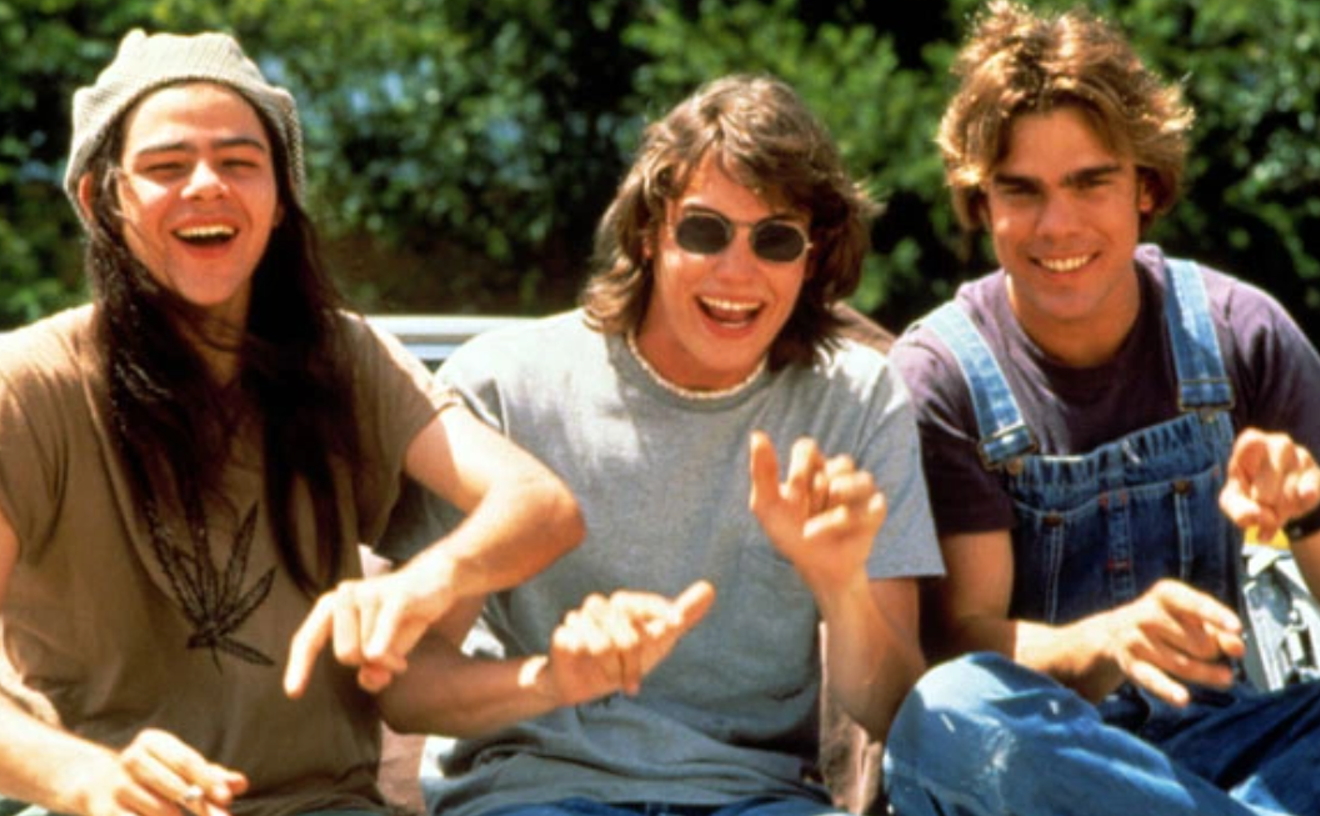If we take a moment to be honest with ourselves, we'll admit that we didn't really read anything in high school. And if you're anything like us, you probably leaned a little more on SparkNotes and CliffsNotes to get through English class than you'd be proud to admit. Even the ones we did read all the way through, we really can't say that we retained much more than the barebones plot. Sorry, English teachers. Thankfully, in our copious amount of free time since high school, we've returned to these classics and discovered there was a reason our teachers assigned them: These books are good. Duh. So learn from our mistakes and take a look at some of the books that you haven't touched since high school but should give a second chance.
The Great Gatsby
By F. Scott Fitzgerald
So you saw the movie. Whoop-dee-do. Don't be that person who thinks that's a substitute for reading the book. As with pretty much every other book-to-movie adaptation, the book is way better. It encapsulates what Americans obsessed over in the 1920s, and in many ways still do today: status, money, and love. Now that we're older and maybe have found ourselves too preoccupied with wealth or love, we can appreciate the cautionary tale of falling victim to these vices and the tragedy of a man, who appears to have everything, self-destructing over the one thing he'll never be able to own. So while the book may lack a catchy soundtrack and Leonardo DiCaprio, do yourself a favor and read it anyway. If nothing else, reading F. Scott Fitzgerald's simple, precise, and almost lyrical prose is worth it.
The Grapes of Wrath
By John Steinbeck
We'll be the first to admit it; The Grapes of Wrath is a tough read. It's long, at least for a high schooler's attention span. It's a sad story — about the Great Depression, loss, poverty, embarrassment, death, etc. And John Steinbeck's ability to translate dialect to his written work is expertly accurate and frustrating. However, beyond those hurdles you'll find a beautiful, honest story of the American ideal of a family sticking together against all odds, keeping their dignity as best they can, and stubbornly pursuing a brighter future. After finishing this classic, you won't question why it won Steinbeck the Pulitzer Prize and a spot on many English classes' syllabi.
By Ray Bradbury
Guy Montag is a fireman in a world where, instead of fighting fires, he creates them to burn books. The masses are kept blissfully unaware of anything beyond their state-of-the-art television screens, and freedom of thought and inquiring minds are feared most. In the age of reality stars, smart phones, and all-day TV show marathons, it isn't hard to imagine Ray Bradbury's dystopian world coming true. And it's this reason that Fahrenheit 451, which was first published over 60 years ago, is still relevant and even more of an urgent reminder that life should not be lived through a television (or computer) screen.
Night
By Elie Wiesel
We can't blame you for not having read Night in high school. We also can't blame you for having an empty box of tissues next to you and not wanting to talk to anyone for a few hours after you finish this book. Great pitch so far, right? But, in all seriousness, we urge you to read Elie Wiesel's memoir. It is possibly the greatest and most heart-breaking depiction of what life was like within German concentration camps during World War II. Wiesel poses big questions that we should all be asking of ourselves and our society and offers an understanding of a portion of our history that can't be found within a textbook. This book is haunting and will stick with you long after you finish the last page, which is exactly what it should do.
The Sun Also Rises
By Ernest Hemingway
It wasn't until years after we read this book for the first time in high school that we actually came to appreciate it and Ernest Hemingway's style in general. He is a literary minimalist, getting straight to the point with his sentences and leaving adjectives and frills behind. This writing style is evident in the plot of The Sun Also Rises as well. There isn't a terrible amount of action and the plot is driven by understated conversations, which we often overlooked during our first reading. But now, with a more open mind about what can be considered drama or excitement, we can see that Hemingway is questioning what it means to be alive through his narrator, Jake Barnes, the limitations he faces, and the relationships he creates with his traveling companions.
Brave New World
By Aldous Huxley
The one thing we remember about discussing Brave New World in school was, at the end of the discussion, the class was torn about whether free will was necessary for an ideal society. Half of the class thought that genetically-determined classes and artificial happiness wasn't so bad. At least everyone was happy, right? The other half's hearts bled for John, The Savage, believing that pain and unhappiness made the good in life that much better and that feeling heartbreak and sorrow was better than feeling nothing at all. With equal parts philosophical questions and literary entertainment, any book that can cause that kind of rift about free will is definitely worth at least one revisit.
Beloved
By Toni Morrison
In the vein of Night, there is only so much you can understand about history from textbooks. Thankfully, Toni Morrison takes that history and props it up, face to face with the reader, in this eye-opening, heart-wrenching novel. Arguably Morrison's best piece of work, Beloved tells the story of an ex-slave, Sethe, who is being haunted by the ghost of her unnamed child, whose gravestone is simply marked "Beloved," and the farm, Sweet Home, where she had been enslaved. The details Morrison provides the reader of Sethe's time at Sweet Home are disturbing and moving enough, but the matter-of-fact way in which these details are revealed puts this work over the edge and into our hands once again.
Wuthering Heights
By Emily Bronte
Despite the connotations that come with the label "romance novel," Wuthering Heights is not a pretty story. Yes, there are soul mates, love, and stunning scenery, but this Bronte sister's only novel is a dark one. The love between Heathcliff, the adopted gypsy boy, and Catherine, the daughter of the house known as Wuthering Heights, becomes as twisted and vengeful as it comes. We should warn, this story is not for everyone. There's a fair amount of abuse, both mental and physical, and Bronte displays some of humanity's ugliest flaws. But if you like dark, passionate, jealousy-wrought, tragically beautiful tales, look no further.
The Bean Trees
By Barbara Kingsolver
This one is for all you Arizona natives out there. If you haven't read what's possibly Arizona's greatest claim to literary fame yet, shame on you. How could you resist the charming story of Taylor, the witty Midwest transplant, and Turtle, the little Cherokee baby dropped into Taylor's lap, or car seat, as it were? Just as Taylor falls in love with Turtle and Arizona, we fell in love with this tale of unexpected life turns, overcoming obstacles and appreciating the tiny miracles of everyday life. Plus, we have to love a book that talks up Tucson even just a little bit. If you haven't read it yet, we'll forgive you — but only if you fix that soon.
1984
By George Orwell
Okay, we promise this is the last dystopian novel we will mention. Is it our fault that writers find they are sometimes best able to provoke readers to question their lives by creating an extreme, futuristic world? George Orwell wrote this piece in 1948, proposing that within four decades, his imagined totalitarian state would come true. A government listening in whenever they want, the alteration of facts of the past to match present agendas and control future happenings, masses mindlessly accepting whatever Big Brother tells them? Obviously, this didn't happen to the extent that Orwell thought by even 2014, but as with Fahrenheit 451, the similarities to our lives and society today are unsettling at best.
To Kill A Mockingbird
By Harper Lee
It's funny how things can seem so black and white through the eyes of a child, with shades of gray only creeping in as they grow older. This is the perspective Harper Lee utilizes, through 8-year-old narrator Scout Finch, to tell the story of a small Alabama town dealing with the trial of a black man accused of raping a white woman during the Great Depression. Though this is one of the books we appreciated and understood most in school, rereading it years later just reinforced Lee's moral stance that not everything is what it seems, and some things require a second look to truly understand them. See what we did there?











